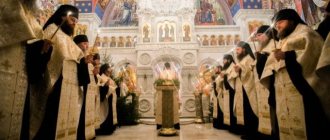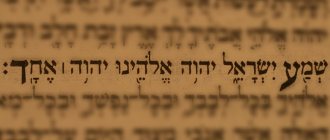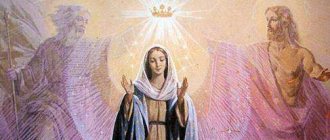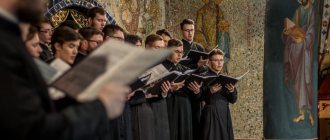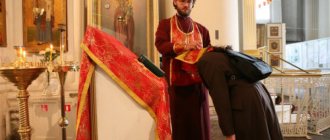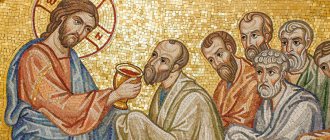| Matthew 6 | |
| ← chapter 5 chapter 7 → | |
| In the Lord's Prayer, in Matthew 6:9, 1500, Vienna. | |
| Book | Gospel of Matthew |
| Category | Gospel |
| Christian part of the Bible | New Testament |
| Order in the Christian part | 1 |
Matthew 6
is the sixth chapter of the Gospel of Matthew in the New Testament. This chapter contains the middle part of the Sermon on the Mount, including the Lord's Prayer. [1]
Text [edit]
Lectionary 239 Folio 39, verso with Greek text of Matthew 6:14-21 (13th century)
The original text was written in Koine Greek. This chapter is divided into 34 verses.
Textual evidence[edit]
Some early manuscripts containing the text of this chapter:
- Vatican Codex (~325–350; complete)
- Codex Sinaiticus (~330–360; complete)
- Washington Code (~400)
- Codex Bezae (~400; extant verses 1-19)
Structure [edit]
The first part of this chapter, Matthew 6:1, deals with the outward and inward expression of piety, referring to almsgiving, private prayer, and fasting. [2] In this part of the chapter, sometimes called “The Boasting Discourse,” [ citation needed
] discusses the three most important outward expressions of Jewish piety, almsgiving, prayer and fasting. Jesus supports the standard teachings about the importance of these actions. In this section he emphasizes that worship and piety should not be ostentatious and should ideally be carried out in secret. It is strongly opposed to those who openly display their piety, which can be understood as teaching that those who are pious to impress others will only impress people and will not do anything to impress God.
Matthew 6:19 – deals with possessions and issues of priorities and trust. [2] The first part in Matthew 6:19 - 24 contains three elements about two treasures, two eyes and two masters. The second part in Matthew 6:25 - 34 is about trusting God and also contains three elements and gives a reason not to worry. [2]
John Wesley's analysis of the Sermon on the Mount in chapter five lays out "the sum of all true religion," allowing the chapter to detail "the rules of that right intention which we should preserve in all our outward actions, unmixed with worldly things." desires or anxious concerns even for the bare necessities of life,” and the next chapter contains “warnings against the fundamental obstacles of religion.” [3] Wesley further analyzes chapter 6 as follows:
- Verses 1 - 4: right intention and thus giving alms
- Verses 5 - 15: right intention, thus the form and premise of prayer
- Verses 16 - 18: right intention, and the way of fasting
- Verses 19 - 34: the necessity of pure intention in everything, unmixed either with the desire of wealth, or worldly care, and the fear of want. [4]
Lessons from Matthew 6
- August 5, 2019
- Sermons
Matthew 6, the center of the Sermon on the Mount, contains some of the most practical teachings of Jesus Christ. The chapter begins with a focus on true worship, which is deeply personal and includes instructions for almsgiving, prayer, and fasting (Matt. 6:1-18). This directly leads to reflection on man's relationship to God and His kingdom (Matt. 6:19-34). Here, as we reflect on the teachings of Christ, it is helpful to ask ourselves questions about our own religious experience: What is our treasure? Who does our heart belong to?
Do we really trust God as a loving Father to provide for our needs because He already knows about them? What comes first in our lives in terms of our mind, body, energy and time?
Interpretation of the chapter
Verses 1-18
- Jesus warns His followers against self-centered righteousness, which is not true righteousness. True worship directs our attention to God and seeks to glorify Him alone.
- Human praise and admiration are cheap compared to the promised heavenly reward (See Matt. 5:12). What is important is a personal relationship with the Father (Matt. 6:1, 4, 6, 8, 14, 18) and doing His will (Matt. 6:33; 7:21).
- For us, as children of our heavenly Father, being like Him means helping the needs of the poor (Deut. 15:7) like Jesus and His disciples (John 12:6).
- Personal prayers should be regular, intimate, and not formal. We share our deepest thoughts with the Father, who already knows our needs, knowing that our prayers will be heard because God gives “good things to those who ask Him” (Matthew 7:11).
- Since God knows what we need and is pleased to give it to us, there is no need for lengthy prayers. This is especially important to remember when praying in public, as the brevity of the Lord's Prayer shows.
- The Lord's Prayer (Matthew 6:9-13) has a chiasmic structure:
A1 Appeal / affirmation of God as Father B1 Three appeals related to God and His kingdom. In “and on earth as it is in heaven” B2 Three appeals related to our needs A2 Establishment of God's kingdom, power and glory.
- The central appeal of the Lord's Prayer implies that the kingdom of heaven is to become a reality for God's people on earth. The satisfaction of personal needs is entrusted to God as our Father and belongs to His kingdom.
- Our debt to God is so great that it cannot be paid, only forgiven. Forgiving such a debt creates a desire to forgive others, even if we have previously been seriously or repeatedly harmed (see Matt. 18:22).
Verses 19-24
- Earthly treasures fall into one of three categories: possessions, popularity, and power. The focus is on possessions because wealth attracts the other two categories of value. But earthly treasures eventually disappear or must be abandoned (1 Tim. 6:7).
- How to store up treasures in heaven becomes increasingly clear—seek the kingdom of God and His righteousness (Matt. 6:33), care for those in need (Matt. 25:37-40), and trust in the present and future blessings of the kingdom (Matt. 5:3- 12; 25:34). What we focus our hearts and lives on reveals what we truly value (Matt. 6:21).
- The Eye is a lamp for the body, which is directed and processed by the mind and heart. If the eye is "one" and focused on God and His kingdom, a person's life will be a source of light and not darkness to others.
- Just as it is impossible to look in different directions at the same time, it is impossible to serve two masters and be faithful to both. Eventually a person's commitment will be revealed. A divided heart cannot live long. The love of wealth and service to “mammon” not only cuts us off from those in need, but also turns our hearts away from God.
Verses 25-34
- The reason not to worry is to trust God, not only in matters of money, but also in meeting physical needs. Worry is discussed here, not business. The birds are busy collecting the food that God gives them, He does not spoon feed them.
- Flowers and grass are temporary; just like human life (Ps. 102:15-16; Isa. 40:6-8), but it is much more valuable. Therefore, we should not worry or wonder how our needs will be met, like the believing Gentiles, because our heavenly Father knows what we need.
- Above all else, even the physical life of man, we are called to seek God's eternal kingdom and His righteousness, not in order to be saved, but because we are already children of the heavenly Father and long to be like Him (see Matt. 5:48).
Practical application of the chapter
Important lessons that can be learned from this chapter include:
1. Worshiping God is a deeply personal and intimate act. Even when serving the needs of others.
2. In prayer, whether private or public, it is important not how long or how much we pray, but to remember to whom we pray and why.
3. What takes up most of our personal time, money and thoughts shows what captures our heart.
4. Since God knows our needs, instead of worrying about them, we should ask our heavenly Father to provide them and trust His will.
Clinton Whalen, Institute for Biblical Research Adapted from the Institute for Biblical Research Bulletin
Tags: biblical studies
Poems[edit]
- Matthew 6:1
- Matthew 6:2
- Matthew 6:3
- Matthew 6:4
- Matthew 6:5
- Matthew 6:6
- Matthew 6:7
- Matthew 6:8
- Matthew 6:9
- Matthew 6:10
- Matthew 6:11
- Matthew 6:12
- Matthew 6:13
- Matthew 6:14
- Matthew 6:15
- Matthew 6:16
- Matthew 6:17
- Matthew 6:18
- Matthew 6:19
- Matthew 6:20
- Matthew 6:21
- Matthew 6:22
- Matthew 6:23
- Matthew 6:24
- Matthew 6:25
- Matthew 6:26
- Matthew 6:27
- Matthew 6:28
- Matthew 6:29
- Matthew 6:30
- Matthew 6:31
- Matthew 6:32
- Matthew 6:33
- Matthew 6:34
(Luke 11:1-4)
5 And when you pray, do not be like the hypocrites, who love to pray standing in the synagogues and on the corners of the streets, so that they may be seen by people. Truly I tell you that they are already receiving their reward. 6 But you, when you pray, go into your room and, having shut your door, pray to your Father who is in secret; and your Father, who sees in secret, will reward you openly.
7 And when you pray, do not talk too much, like the pagans, for they think that for their many words they will be heard; 8 Do not be like them, for your Father knows what you need before you ask Him. 9 Pray this way:
Our Father who art in heaven! Hallowed be Thy name; 10 Thy kingdom come; Thy will be done on earth as it is in heaven; 11 Give us this day our daily bread; 12 And forgive us our debts, as we forgive our debtors; 13 And lead us not into temptation, but deliver us from evil. For Yours is the kingdom and the power and the glory forever. Amen.
14 For if you forgive people their trespasses, your heavenly Father will also forgive you, 15 but if you do not forgive people their trespasses, then your Father will not forgive you your trespasses.
Full text[edit]
In the King James Version this chapter reads:
¹ Beware that you do not give alms in front of people, so that it is visible to them: otherwise you will not receive a reward from your Father in heaven.
² So, when you give [your] alms, do not sound a trumpet before you, like the hypocrites in the synagogues and in the streets, so that they will be glorified by people. Truly I tell you, they have received their reward. ³ But when you do alms, do not let your left hand know what your right hand is doing: ⁴ so that your alms may be in secret; and your Father, who sees in secret, will reward you openly.
⁵ And when you pray, do not be like [the hypocrites]: they love to pray standing in the synagogues and on street corners so that people can see them. Truly I tell you, they have received their reward. ⁶ But when you pray, go into your room, and when you close the door, pray to your Father who is in secret; and your Father, who sees in secret, will reward you openly. ⁷ But when you pray, do not repeat in vain, as the pagans [do]: for they think that they will be heard because of their many words. ⁸ So be not like them: for your Father knows what you need before you ask Him.
⁹ So pray like this: Our Heavenly Father! Hallowed be Thy name. ¹⁰ Your kingdom has come. Thy will be done on earth as it is in heaven. ¹¹ Give us this day our daily bread. ¹²And forgive us our transgressions, as we forgive the criminals against us. ¹³ And lead us not into temptation, but deliver us from evil: for Thine is the kingdom and the power and the glory forever and ever. Amen.
¹⁴For if you forgive men their trespasses, your heavenly Father will also forgive you: 15 But if you do not forgive men their trespasses, neither will your Father forgive your trespasses.
¹⁶ Moreover, when you fast, do not be like the hypocrites, with a sad face: they disfigure their faces in order to appear to people as fasting. Truly I tell you, they have received their reward. 17 And you, when you fast, anoint your head and wash your face; ¹⁸ So that you may not appear to people who fast, but to your Father who is in secret; and your Father, who sees in secret, will reward you openly. ¹⁹ Lay up not for yourselves treasures on earth, where moth and rust destroy, and where thieves break in and steal: ²⁰ But lay up for yourselves treasures in heaven, where neither moth nor rust corrupts, and where thieves do not break through the earth. nor steal: ²¹For where your treasure is, there will your heart be also.
²² The light of the body is the eye: therefore, if your eye is one, then your whole body will be full of light. “But if your eye is evil, your whole body will be full of darkness. So, if the light that is in you is darkness, how [great] is the darkness!
“No one can serve two masters: either he will hate one and love the other; otherwise he will stick to one and despise the other. You cannot serve God and mammon.
“Therefore I say to you: do not worry about your life, what you will eat or what you will drink; nor yet for your body, what you put on. Is not life more than meat, and the body more than clothing? “Look at the birds of the air: they do not sow, nor reap, nor gather into barns; but your Heavenly Father feeds them. Aren't you much better than them? “Which of you, after thinking, can add one cubit to your height? ²⁸ Why do you think about clothes? Look at the lilies of the field, how they grow; they toil not, neither do they spin: ²⁹ And yet I say unto you, that neither Solomon in all his glory was arrayed like one of these. ³⁰So, if God so clothes the grass of the field, which is today, and throws it into the oven tomorrow, then shall He not [cloth] you more, O you of little faith? ³¹ So, do not worry and say, “What shall we eat?” or what should we drink? or what to wear? ³² (For all these things the Gentiles seek), for your Father in heaven knows that you have need of all these things. ³³ Seek first the kingdom of God and His righteousness; and all this will be added to you.
“So, do not think about tomorrow: for tomorrow will take care of things for itself. The evil of his day is enough.
About alms 6, 1-4
1 Be careful that you do not do your alms in front of people so that they will see you: otherwise you will have no reward from your Father in heaven.
2 So, when you give alms, do not sound a trumpet before you, as the hypocrites do in the synagogues and in the streets, so that people may praise them. Truly I tell you, they are already receiving their reward. 3 But when you give alms, do not let your left hand know what your right hand is doing, 4 so that your alms may be in secret; and your Father, who sees in secret, will reward you openly.
Links[edit]
| Wikimedia Commons has media related to Gospel of Matthew - Chapter 6 . |
- Turner, David L. Matthew
2008 ISBN 0-8010-2684-9 p. 210. - ^ abc Talbert, Charles H. 2010 Matthew
ISBN 0-8010-3192-3 pp. 87–91. - ↑
Wesley, J., Sermon 21, After Our Lord's Sermon on the Mount: Discourse One, accessed August 10, 2022. - ↑
Wesley, J., Wesley's Notes on Matthew 6, accessed August 15, 2022. - Jump up
↑ Rowling, J. K. (2007). Harry Potter and the Deathly Hallows . Book 7 (illustrated edition). Books by Arthur A. Levine. paragraph 326. ISBN 978-0-54501022-1. - ↑
Garcia, Elena (October 19, 2007).
"Harry Potter Author Reveals Books' Christian Allegory, His Overwhelming Faith". Christian today
. Retrieved February 6, 2011. - ↑
Egerton, Joe (26 November 2010).
"From Harry Potter to Jesus Christ". Thinking Faith
. Retrieved April 7, 2022.
References
| Wikimedia Commons has media related to Gospel of Matthew - Chapter 6 . |
- Turner, David L. Matthew
2008 ISBN 0-8010-2684-9 p. 210. - ^ a b c
Talbert, Charles H. 2010
Matthew
ISBN 0-8010-3192-3 pp. 87–91. - Wesley, J., Sermon 21, After Our Lord's Sermon on the Mount: Discourse One, accessed August 10, 2022.
- Wesley, J., Wesley's Notes on Matthew 6, accessed August 15, 2022.
- Rowling, J. K. (2007). Harry Potter and the Deathly Hallows
. Book 7 (illustrated edition). Books by Arthur A. Levine. item 326. ISBN 978-0-54501022-1. - Garcia, Elena (October 19, 2007). "The author of Harry Potter reveals the Christian allegory of his books, its irresistible faith." Christian today
. Retrieved February 6, 2011. - Egerton, Joe (26 November 2010). "From Harry Potter to Jesus Christ." Thinking Faith
. Retrieved April 7, 2022.

